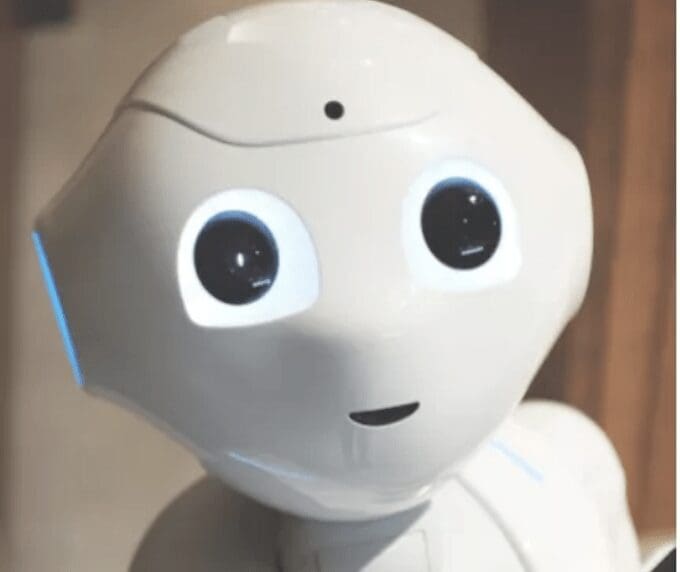In this series Luke explores the Eight Modern Giants introduced by Economist Guy Standing in his recent report Basic Income as Common Dividends. Here we look at Precarity, perhaps the most abstract of the Giants but something that has a profound impact on the way we experience the modern world.
The 6th ‘giant’ of this series is automation or what Standing labels ‘The Advancing Robots’. This is a big one and automation is a key reason for Basic Income entering the mainstream as a policy fit for the future. USA Presidential candidate Andrew Yang has made Basic Income (or what he calls a ‘Freedom Dividend’) the backbone of his campaign, mainly because ‘the robots are coming’.
Automation is the use of automatic equipment, artificial intelligence or robots to do certain tasks. As we progress technologically the robots advance into more and more workplaces. The big fear is that the robots are going to steal all our jobs! Now whilst this does make a refreshing change from the immigrants are going to steal all our jobs, the idea of automation making us all permanently unemployed is maybe getting a bit carried away. But nonetheless, huge swathes of tasks currently performed by humans will soon be the robots’ responsibility. If this causes a sudden wipeout of paid work a Basic Income is seen as a nifty and logical idea to prevent people starving while without an income from employment. Another possible result of widespread automation is the creation of new jobs, although the new jobs may include you being a robot’s assistant. An irresponsible introduction of robots into our workplaces may lead us to a wipeout of paid employment or the creation of new, increasingly precarious and undesirable kinds of work. And it is these two streams of thought that I want to explore throughout this article. Be it through providing economic security out with employment, or empowering people to question exploitative new jobs, a Basic Income can help us work in harmony with the advancing robot workforce.
The robots are going to steal all our jobs!
Let’s start with the doomsday scenario – the robots steal all our jobs. The Bank of England declared in 2015 that 15m jobs are threatened by robots and the OECD have similarly talked about the risk of a ‘jobless future’. Now technology taking over from humans at work isn’t a futuristic or even modern idea, but something that has been going on for a long time. Think back to thousands of manufacturing workers across the world who have been systematically replaced by robots that produce goods infinitely faster and often to a higher standard. If automation has existed for ages, why are we suddenly getting so worked up about it now? Well it seems many people believe we are on the cusp of a technological revolution that will see the use of robots expand far beyond the manufacturing industries. With jobs like tax analyst, legal clerk and other finance stuff being touched by automation white-collar work is threatened and panic is on the rise. I guess tax advisers and bankers were too busy advising and banking to speak up when blue-collar manufacturers were losing their jobs. But either way, automation could replace millions of office jobs as well as wiping out lorry drivers (the most common job in 29 US states). The worst-case scenario is that people are left unsupported when they are removed from their jobs that provide the income that puts food on the table.
Sticking with this ‘doomsday scenario’ for a bit longer, I sort of question how much of a nightmare it truly is. Now I’m not stupid, I know mass unemployment with no meaningful counteraction would cause chaos for every household it affected. Leaving people with no opportunity to work and contribute to something meaningful can be devastating for individuals and communities. But how much does our current world of work address this anyway? Could this technology driven nightmare actually be a technologically enabled revolution? Freeing people from jobs which are intrinsically monotonous and anything but fulfilling should be seen as hugely positive. In a world full of call-centres, inefficient bureaucratic processes and endless paperwork we could do with taking a look at the jobs we push people into for 35 hours a week. If robots can sort things more quickly and efficiently, all without the use of a company car, then let them! But we must look after people as we make this shift. We cannot allow this to cause major disruption to people’s lives. With a Basic Income supporting people and guaranteeing a standard of living, the mass extinction of these unnecessary jobs could open the door to different kinds of work and activities. Activities chosen by people who are empowered by the gift of time given to them by our hardworking advancing robots and a sufficient Basic Income. We need to stop seeing jobs as ends in themselves. No longer does work guarantee a life without poverty or improved wellbeing. Maybe, just maybe, this doomsday scenario is exactly what we need to shake off this obsession with living to work. We could begin to prioritize people’s wellbeing and interests, over business interests and the wellbeing of their bank account.
If robots can sort things more quickly and efficiently, all without the use of a company car, then let them! But we must look after people as we make this shift.
Let’s move onto the second idea: that automation won’t lead to mass unemployment, but rather the creation of new jobs. The International Monetary Fund and World Economics Foundation (both concerned with how money interacts with people across the globe) have claimed the automation will actually create jobs. But like I mentioned, jobs cannot be ends in themselves, and there is widespread concern that the new jobs created through automation won’t be particularly desirable. Standing refers to the IMF’s prediction that automation will improve productivity, but lower wages: “automation is good for growth but bad for equality”. And that is a major concern and a key threat of automation. The gap between the workers and the owners of the robots will grow and grow as productivity gains enable huge profits at the same time as precarious work increases. It’s suggested that whilst automation will lead to people no longer doing certain jobs, there will be a net gain due to new jobs created. But there is no certainty that new jobs will match the skills of the lost jobs and no guarantee that those who lose their jobs due to automation will be parachuted into these new jobs.
It becomes evident that automation will cause major changes to the way we live and work. But this is not certain to manifest itself in the form of mass unemployment and people lining the streets. The creation of new jobs which place you at the whim of increasingly wealthy business owners is just as big a threat. And if this is the reality of increased automation, a Basic Income will provide the necessary support and platform. Rather than people being driven by fear of the advancing robots, and being forced into precarious, low-waged work, they will be empowered. Having the security of a Basic Income will mean no one is forced to take shit jobs that pay you nothing, instead you have a platform to either demand better from your employer, or pursue other work. And again, this platform (I think anyway) will see the reinvention of work itself. With a Basic Income, artistic, voluntary, care-based and sustainability work is valued and supported. In an automated world with new precarious jobs, a Basic Income will enable people to create their own future and manufacture their own kind of work. As well as robots can stack paper, work out people’s tax and drive you around, they will not be able to match human abilities to empathize, be compassionate, be loving and fight for justice. And in a world with a robot workforce we can focus on driving our societies towards these values.
A Basic Income is the tool needed to embrace this opportunity for making work work for humans, while the robots crack on with our old jobs.
When looking at these two potential consequences of the advancing robots, it becomes clear a Basic Income provides not just the safety net, but also the springboard for people to thrive in an automated economy. If the doomsday scenario comes and we are all out of a job, a Basic Income is a safety net that ensures we don’t starve and a springboard for pursuing our passions to replace our previous work. If we are offered precarious or undesirable jobs a Basic Income enables us to seek an alternative, holding employers accountable and creating new ways to generate value. Coexisting with robots is not just the future but the present. Technology evolves quickly and ultimately it is driven by human interest. As the world of work is transformed by technology we must ensure that new efficiencies don’t just benefit businesses and consumers but workers too. A Basic Income is the tool needed to embrace this opportunity for making work work for humans, while the robots crack on with our old jobs.
This blog is one of a series looking at Guy Standing’s recently published report, written for the Shadow Chancellor, ‘Basic Income as a Common Dividends’. Influenced of course by Beveridge, Standing reflects on the eight modern giants he sees as stalking modern Britain. He comments on how these giants are having a protracted negative effect on society as well as the economy, and how a Basic Income can be a key tool in combatting the growing challenges these giants pose. In the next few weeks, we will be releasing a series of articles analyzing Standing’s eight giants and delving further into how the Basic Income can (and will) combat them.
The giants are inequality, insecurity, debt, stress, precarity, automation, ecological crises and the rise of neo-fascism and the far right


















